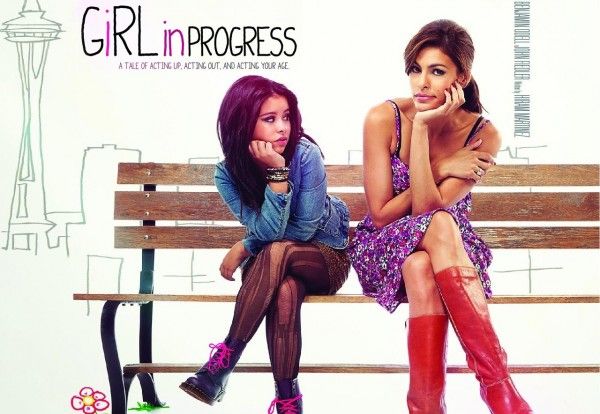In the drama Girl in Progress, actress Eva Mendes plays single mom Grace, a woman who is too busy juggling work, bills and her very married doctor boyfriend (Matthew Modine) to give her teenage daughter, Ansiedad (Cierra Ramirez) the attention she desperately needs and craves. Fed up and frustrated, Ansiedad is inspired to skip adolescence and get an early start on her life without her mother, but quickly learns that, in trying so hard to grow up, she just might end up exactly like the woman she’s trying so hard not to become.
At the film’s press day, Eva Mendes talked about playing such a damaged and complicated character, how she sees herself as a work in progress, her own difficult transition from girl to woman, working with her young co-star, and having no hesitation about playing a mom. She also talked about her recent trip to Sierra Leone, for an upcoming PBS documentary. Check out what she had to say after the jump.
Question: What was it about this role that attracted you?
Eva Mendes: I was attracted to the fact that the character was such a mess of a woman and such a disaster of a mother, but really, truly trying her best. I wanted to play a really flawed, real human being, and I knew, within the first few pages of the script, that she was that. I think she’s just awful. I love that she’s a work in progress, and I love that she’s trying her best and she somewhat finds her way. But, it’s hard for me to divorce myself from the character, at this point, and be objective ‘cause I see her and I’m just like, “Stop blowing smoke in your kid’s face! What are you doing?!”
How much of a girl in progress are you, at this stage of your life?
Mendes: Personally? Oh, gosh! I often refer to myself as a work in progress, so it’s funny that this is the title of the film. I’m always taking the odd class, in anything, to grow. I’ll take a class in any area. I just took a course in Thai massage. It sounds so funny, but I enjoy giving massages. My mom has terrible neck and back problems, so I grew up massaging her and I feel like she trained me well, so I took a course in Thai massage. I’ve got to say, I’ve been told I’m pretty good.
Are you a certified masseuse now?
Mendes: In the States, I’m not certified, but overseas I am. It’s harder to get certified here, in the States.
What was your own transition from girl to woman like?
Mendes: I think the years between 7th grade and my junior or senior year in high school were pretty difficult because I was really on a mission. I wanted to be my own independent person. I was so close to my family, especially back then, and so closely tied to them and their beliefs, that I really wanted to divorce myself from them and figure out who I was, independent of them. That was my mission, and that was really rocky.
What did you learn from working with your young co-star, Cierra Ramirez?
Mendes: How simple it could really be, and I really mean that as a true compliment. I think I have a tendency to complicate things. Maybe it’s the actress in me that can appreciate a dramatic plot. For instance, Cierra has incredible access to her emotions. She is so incredibly talented, and it was such a pleasure to work with her. It was incredible to watch her access her emotions so easily. I remember one day we were doing the emotional scene on the bus and the director really wanted me in tears, but I was like, “I don’t know. I’m not feeling them. Maybe the character doesn’t want to cry.” You have those moments. So, I started forcing emotion out, and that’s never fun. The camera would be on me, but I’d look to Cierra and she would be crying and her tears would be flowing. There was no effort, though. She just allowed it to happen. And I asked her that day, “How do you do it?” It was her first movie, but I asked her, “How do you do it?,” and she said, “I just think of what my character is going through and I feel so sad for her.” I was like, “Duh! Come on, Mendes, get it together!” It was just the simplicity of going back to the basics that was great, instead of complicating everything.
Did you have any hesitation about playing the mom? Do you worry that it might make you less sexy?
Mendes: First of all, sexy is just one component. It’s not a thing I am. It’s a thing I can be. It’s a side of myself I can tap into, just like I can tap into my funny side, my quirky side or my dramatic side. It’s not what I am. And then, rewinding a bit, my first role that put me on the map in this business was in Training Day. It was only two scenes, but that’s what got me in and that’s what started it all, and I played a mother. I think that, when you play a mother, whether you play a bad mother or a not so great mother or an amazing mother, being a mother is already so complicated. It’s already three-dimensional, automatically, no matter what the role is, because you’re playing a mother. I welcome it. The more complicated a role can be and the more flawed a character can be is what I’m looking for. The careers that I admire and actually try to emulate are those of Julianne Moore and Annette Bening. Those women, to me, make amazing choices. They’re sexy, beautiful women, but that doesn’t dictate their choices.
What did it mean to you to be a part of a film with so many Latina women?
Mendes: All I can say is that anytime I see women out there, from all walks of life and all ethnicities, actually having something to do, whether it’s in television or film, that’s exciting for me. I wish writing was a talent that I had. I’ve tried. Unfortunately, I’m just not talented in the writing department. But, if I was, I would just write complicated roles for women because there’s a lack of them out there.
Your character has this epiphany moment where she realizes that she’s like her own mother was and it changes her. Do you think that people can really change that quickly?
Mendes: That’s a good question. I think an epiphany can change a lot, so I do believe that people can change quickly. I have full faith in people. I think that we have the ability to change. We’re habitual creatures. Once we figure out that bad habit and identify it, whether it’s behavioral or whatever it may be, we change our habits. Obviously, I’m simplifying it and making it sound very easy to do, and we all know it’s very difficult, but it’s doable.
How did you come to be doing a documentary on Sierra Leone, and why was your trip there so important to you?
Mendes: I went to Sierra Leone last year, about six months ago, and it was actually based on this book called Half the Sky, that Nicholas Kristof wrote with his wife, Sheryl. We’re doing a PBS documentary, 4-part series with the same title. My portion is the Sierra Leone portion, and I went there to meet this amazing local woman who started this organization, called The Rainbow Center, that helps girls that are victims of rape. Basically, 10 years ago, the Civil War ended there and people no longer burn each other’s villages and shoot one another, but the rapes have continued, and a huge percentage of these young women that are raped are under 12. So, we went there to shed some light. That will be coming out in October, I believe. That was a big eye-opener for me.


